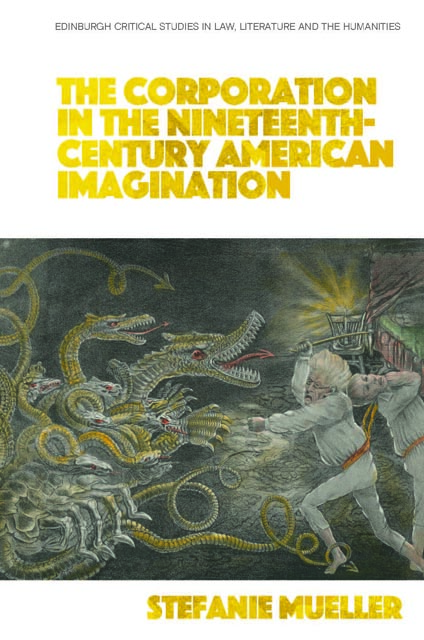Book contents
- Frontmatter
- Contents
- List of Figures
- Acknowledgments
- Introduction: The Many and the One: Corporate Bodies and the Body Politic in US Law and Culture
- 1 Narrating Monopoly and Empire: Austin, Irving, and the Charles River Bridge Case
- 2 The Soulless Corporation: Cooper and the Decline of the Republic
- 3 Satanic Corporate Agents in the Marketplace: Hawthorne, Melville, De Forest, and the Uses of Allegory
- 4 Incorporating the Nation: Ruiz de Burton and “Quasi Public” Corporations
- 5 The End of Individualism: Tarbell, Norris, and the Power of Combinations
- Conclusion: Frankenstein in a Gray Flannel Suit
- Bibliography
- Index
2 - The Soulless Corporation: Cooper and the Decline of the Republic
Published online by Cambridge University Press: 25 April 2023
- Frontmatter
- Contents
- List of Figures
- Acknowledgments
- Introduction: The Many and the One: Corporate Bodies and the Body Politic in US Law and Culture
- 1 Narrating Monopoly and Empire: Austin, Irving, and the Charles River Bridge Case
- 2 The Soulless Corporation: Cooper and the Decline of the Republic
- 3 Satanic Corporate Agents in the Marketplace: Hawthorne, Melville, De Forest, and the Uses of Allegory
- 4 Incorporating the Nation: Ruiz de Burton and “Quasi Public” Corporations
- 5 The End of Individualism: Tarbell, Norris, and the Power of Combinations
- Conclusion: Frankenstein in a Gray Flannel Suit
- Bibliography
- Index
Summary
In the popular imaginary of the late eighteenth and early nineteenth centuries, corporations were not only associated with monopoly, but also with conspiracy and corruption. When the narrator in “Martha Gardner” exclaims that “conscience is a non-corporate word,” he is alluding to what was at the time a well-known trope, the soulless corporation (Austin 572), and hence, implicitly, to the transformation of the corporation at the beginning of the nineteenth century from a public tool that serves the general interest to a private instrument that serves selfish purposes. On the one hand, this trope emerged from a republican tradition that was increasingly under pressure as the nation experienced the democratization of both political and economic spheres: the market revolution and the expansion of the franchise under Andrew Jackson. From that perspective, the corporation became an emblem of selfish pursuits, and none more than the banks or so-called moneyed corporations. For Democrats, such as the author James Fenimore Cooper, soulless corporations presented a political elite corrupted by wealth, and their corrupt designs were hidden precisely by the incorporated entity and what the law called the corporate veil. In this way the corporation became associated not only with monopoly privileges and the corruption that followed from a privileged pursuit of selfish goals, but also with conspiracy. For Whigs, on the other hand, these selfish goals were attached to an older nightmare of irrational mobs in the streets, a collective body cut loose from its sovereign head: the many-headed beast of the plebeian masses.
To understand corporations’ association with conspiracy and corruption in the popular imaginary during this period, this chapter begins with a brief look at the key beliefs of civic republicanism. Then it turns to the controversies over central banking from the eighteenth century to the Jacksonian era, as well as to the controversy surrounding President Andrew Jackson’s veto over the rechartering of the Second Bank. By reviewing these controversies and how they activated the popular trope of the soulless corporation, the chapter shows that it was the legal form itself, the specific organizational structure of corporations, to which fears of conspiracy and corruption attached: its collective nature, its investment structure, and its increasing dedication to financial pursuits. The chapter’s middle section presents a detailed analysis of James Fenimore Cooper’s The Bravo (1831), today one of Cooper’s lesser-known and certainly less studied works.
- Type
- Chapter
- Information
- Publisher: Edinburgh University PressPrint publication year: 2022



